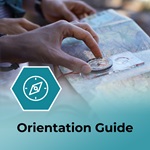In one of his letters, the Apostle Paul wrote, “God, who encourages those who are discouraged, encouraged us by the arrival of Titus.” (2 Corinthians 7:6 NLT). You don’t have to be discouraged to be encouraged by other pastors. One thing is certain, we need each other when times are terrific and terrible.
Sometimes we need older mentors and sometimes we need seasoned veterans, and sometimes we need the passion of youth. One of the leaders I’ve had the privilege of getting to know in 2019 is a young pastor who serves a thriving church in the northern suburbs of Cincinnati, OH.
I met Matt through a social media group we both belong to and in our short friendship, I’ve learned a bunch from this passionate, young pastor. If you’re a young leader, new to your post, or work with those who are, I think you’ll greatly enjoy this interview!
Matt, thanks for joining me in the conversation. Let’s start with your story. How did you end up in this role at your church?
While attending church was a priority in my family as I grew up, I never truly got immersed into a community of believers my own age. As a result, I became an independent person, whose emotions, actions, and goals were self-centered and seldom shared with others. God changed my life through the presence of Christian community.
Getting connected with other believers through various college ministries (Navigators and h2o) allowed me to visibly witness and experience grace as I opened up my life, shared my sin, and maintained accountability with fellow brothers and sisters in Christ.
When I graduated from college in March 2011, I considered several options including going on staff with a college ministry, going to seminary, and jobs related to my degree in economics. I ended up taking a position with an insurance company and moving back to Cincinnati. When I moved back, I knew that God wanted me to get connected to a local church.
I had a high school teacher who connected me with Rivers Crossing more than seven years ago. As I got involved in ministry efforts and was given opportunities to lead and serve, God continued to remind me of a call to ministry that I had wrestled with during college. God also used other people to speak encouragement and confirmation to this potential calling.
For many years, I prayed about and kept my eyes open for a potential opportunity to walk in obedience to what I believe God has called me to–full-time ministry. Well in December 2018, I got an email from Rivers Crossing’s executive pastor letting me know that a full-time staff position was opening up to oversee the church’s groups ministry. I started in my current role as Director of Groups in February 2019, and just this past May, I was also given the responsibility of Online Campus Pastor.
Thanks for sharing, Matt! I bet many of those reading can resonate with your testimony. While some have known since their youth they were called to vocational ministry, many more of us were pursuing something else when that call came. You shared a bit of your personal experience with Christian community. What do you love about small groups?
I love that God used small groups to transform my life and relationship with Him. I love that the relationships you form through small groups serve as tremendous catalysts for spiritual growth. I love that small groups are a laboratory setting (just with less white coats and beakers and more couches and coffee) where you can process and dissect what God is speaking through the Bible and how it’s relevant to your daily life.
I love that small groups are an environment where the care and support for one another can be one of the most beautiful portrayals of the identity of royal priests (see 1 Peter 2:9) that God gives to every Christian.
And I love that through the vulnerability we display and the acceptance we find in small groups, we’re better able to understand God’s heart. As Tim Keller wrote in The Meaning of Marriage,
“To be loved but not known is comforting but superficial. To be known and not loved is our greatest fear. But to be fully known and truly loved is, well, a lot like being loved by God. It is what we need more than anything. It liberates us from pretense, humbles us out of our self-righteousness, and fortifies us for any difficulty life can throw at us.”
That is such a terrific perspective! “To be fully known and truly loved is…a lot like being loved by God.” As they say, “That’ll preach!” When a church is young and growing, like yours, it seems like everything has to be done today! How do you figure out what to focus on (and what to put on the back burner)?
I’m a big to-do list maker I do this at the start of each week to get a picture of what’s ahead of me. Then I allocate tasks to certain days of the week. It isn’t a perfect process, but I’ve found it helps greatly with two crucial aspects of planning–prioritization and time allocation. I run this planning schedule by our church’s Connections Pastor (who I report to) and allow him to speak into/realign my focus as needed.
A former boss shared with me the Eisenhower Matrix (see below; also known as the Urgent-Important Matrix) that I use when prioritizing my work.
Knowing your personality is also important here. I tend to be a tasks-first, people-second kind of person. That often suited me well in my prior jobs. But I’m learning that with vocational ministry, I need to focus on being more people-first and tasks-second. I believe this shift in focus is the difference between simply ministering to others versus doing ministry through others. While I believe I’m called to do both, I want my work in ministry to be a true reflection of Ephesians 4:11-13–an equipping of the saints (i.e. the church congregation I’m serving).
I’m also working to build “flexible time” (a few hours) into my weekly schedule. Intentional free space in my calendar. I want this time to be available for extra time to spend with God or for people who have pressing needs. If I pack my schedule so full that I don’t allow for flexibility, then I’m setting myself up for personal frustration. Plus, I’m turning away opportunities that God is providing me to build deeper and stronger relationships with others.
I always love hearing how people structure their time. Your connection between a decision-making grid, an awareness of your own personality, rooted in theology is really helpful! Let’s get specific when it comes to decision-making. What are the challenges you are currently addressing?
Great question! Here are a few that come to the top of my mind:
Assimilation – What are the best/most compelling ways that I can help create new groups and plug church members into either these new groups or existing groups. Our church has tried a variety of processes (multi-week in-person events, one-day in-person events, online sign-ups, etc.) and we’re always looking to refine in this area.
Positioning Groups – Our church has a lot of other areas and ministries an attendee could be involved with besides groups. I’m always thinking about how best to position our groups ministry and how groups can be connected with and support other areas of the church.
Forming Online Community – Our church has been live streaming Sunday services for multiple years. But we’re just beginning to be intentional about how to create and cultivate community among our online attendees. This is definitely a stretching area for me.
Caring for Group Leaders – One of the most humbling realizations since joining staff is that I alone can’t care for all of our group leaders with the amount of depth I want to. I need the help of others. I’m learning to lessen the control I have over ministry processes and structure so that I can bring other volunteers and groups ministry champions alongside me to support this effort to care for our group leaders.
I’ve been a pastor for more than twenty years and sometimes I think, “what I would do if I was new to vocational ministry today”. Ten years ago several organizations hosted conferences and seminars for small group directors. Currently, there are few such options. Where do you go to stay current, hear fresh ideas, or simply to deepen your knowledge of the small group “basics”?
Love this question since Learner is at the top of my StrengthsFinder list! I’ve definitely made it a priority to seek out avenues and people to learn from when it comes not just to leading a small group ministry, but also remaining healthy while serving vocational ministry.
When I began serving in my current role in February 2019, I identified a few churches across the country that I look to frequently for inspiration and fresh ideas when it comes to groups. Those churches are North Coast Church (CA) and North Point Community Church (GA).
I can’t recommend enough the following small group ministries/networks – SmallGroups.com (through Christianity Today) and the Small Group Network (run out of Saddleback Church in CA). The investment I made in my SmallGroups.com annual membership was one of the best uses of my budget during my first year of ministry.
I’ve benefited greatly from their resources, especially the training tools. God has used the Small Group Network (SGN) and their Facebook Group to help me begin building a relational network with so many amazing small group pastors and leaders across the country. The collaboration and care for one another in that network is truly incredible.
I enjoy listening to podcasts whenever I’m working around the house or walking. Two I recommend for small group point people are Group Talk by the SGN and Group Answers Podcast with Chris Surratt and Brian Daniel by the Lifeway Leadership Network. Plus, I’m always looking for book recommendations. Currently, I’m reading, and being greatly challenged by, Leading Small Groups That Thrive by Ryan T. Hartwig, Courtney W. Davis, and Jason A. Sniff.
God has also shown me that some of the best inspiration and knowledge on small group practices comes from the very group leaders God has set up in my church! I’m learning to lean into my leaders more deeply and allow them to speak into our group ministry.
One final note on this question. As my answer shows, there is no shortage of great material available on small groups ministry. But I still need to frequently remind myself that it’s most important to connect with God directly about His plans for my life and for the ministry He’s given me to lead. Learning from others is healthy, but if it ends up replacing getting direction and affirmation from God, then it has become unhealthy.
Terrific answer! There’s no shortage of resources available for the curious leader! If you could fast-forward ten years, what is different about your small group ministry than it is today? What are you doing today to build that future?
This is not going to shock anyone, but I’d love to see more people in groups! In a church our size (typical adult attendance pre-COVID-19 of 2,000-2,500), I know there are a lot of people who aren’t connected into community and I want to change that.
I’m currently putting a lot of my time into enhancing our new group leader training and implementing a coaching structure. The hope is that new group leaders will be equipped not just with skills for how to lead, but also with the relational support necessary to catalyze growth as a group leader and a follower of Jesus.
Our primary groups, which are called Community Groups, use sermon-based curriculum. While we love this format, I’d like to see an expansion of our group offerings, especially short-term groups and classes, to complement our sermon-based groups and give people an experience of what it’s like being in community.
We’re continuing to experiment with different classes and offerings here, both with in-person groups and online groups. Some have been successful, while others haven’t. But, the important part is we’re trying and learning!
I’d also love to see our community groups become more missionally/outward focused. While our church places an emphasis on serving, I haven’t yet figured out how to truly work that part of our culture into our groups. Right now, I’m simply praying about how to do this in the future and am having some initial conversations with our Director of Missions.
Finally, I have a heart to see an expansion of our men’s and women’s ministries. Right before COVID-19 hit, we had plans to hold a large conference and launch a revamped men’s ministry through this conference. That was all put on hold, and if I’m honest, my disappointment took a while to process with God.
As a church, we’re still hoping to hold this conference and launch these new groups, but our timing has definitely been changed. Right now, I’m touching base with potential leaders, keeping them updated on our plans, and praying for what God will do through our planning and this new timing.
Matt, like many young leaders you have a young family. How do you balance out the demands of your church work and with your responsibilities to your family?
Great question! I’m definitely a work in progress in this area. As someone who is new to full-time vocational ministry, I’ll admit to feeling the pressure to work hard and keep working even during my off days.
It’s a struggle that boils down to where and how I find my ultimate source of identity. One of the most beautiful and life-giving things about the gospel of Jesus Christ is that my identity is found not in what I do and accomplish, but in what Jesus has done and accomplished for me. I need that reminder almost daily.
My work schedule with the church is Sunday through Thursday. So Fridays and Saturdays are committed days with the family. I’ve removed those dates from a program I use to schedule appointments. Aside from emergencies, I do my best to turn off my work email on my phone and get away from my computer on those days.
I’ve also requested that my wife “call me out” and hold me accountable when she feels I’m not being very healthy at navigating this work/life balance. My wife and I have also found that sharing our schedules in advance helps to create better work/life balance. Some ministry events are held in the evenings. So instead of my wife finding out about those last minute, this calendar sharing process allows us to plan ahead and schedule other times during the week where her and I, or our entire family, can be together.
Finally, I read a book several years ago by Pastor Andy Stanley called When Work and Family Collide. In this book, Pastor Andy presents the Biblical principle that it honors God when we prioritize our family over our work. I highly recommend it for practical wisdom in this area.
I have a co-worker who has 30+ years in ministry. He reminds me that while vocational ministry is an incredible calling, a job with a church could be taken away in an instant. And if that were to happen he says, you don’t want to come to the realization that you’ve neglected your family.
Finally, what advice would you give to a new leader stepping into small groups ministry for what to focus on during their first 90 days?
My best piece of advice is to focus on people and relationship building. That starts with your relationship with God and time spent with Him, especially in prayer. Prioritize your spouse and family and begin creating rhythms that will promote a healthy work/life balance. Work hard at getting to know the other church staff members and your core group of volunteers (i.e. group leaders, coaches, etc...).
I spent a lot of my initial time on staff meeting with people, asking them questions, and listening. I practiced the same advice I give to new group leaders on facilitating great conversations. These investments in relational capital pay huge dividends down the road.
One final suggestion, unless it’s necessary or you’ve been hired to do otherwise, I would encourage a new leader not to change very much during their first several months. That doesn’t mean, though, that you can’t pray and plan for the things you’d like to change.
Matt, thanks so much for sharing your experience with us! Let’s do this again in five to ten years when you are the not-so-young leader!












